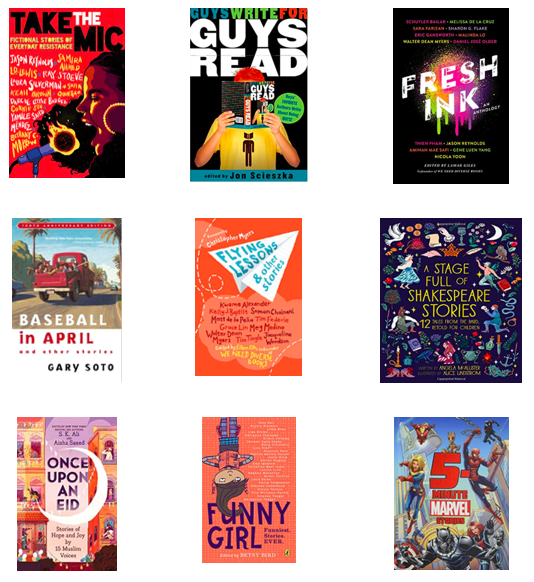We offer you Short Texts at Your Fingertips. One or two times each week, we provide teaching ideas around a different type of short text that is easily found in the home, so that no family feels under-resourced. These ideas can integrate into virtually any curriculum and pedagogy, from Workshop to basal. If you are a caregiver, teacher, or curriculum director, these brief but mighty texts and lessons are our way of saying thanks. And our way of giving children authentic and enjoyable reading and writing engagements each day.
Written by Julie Wright & Elizabeth Keim
SHORT TEXTS AT YOUR FINGERTIPS: SHORT STORIES
Short stories provide lots of benefits for readers of all ages, one being they are short! Or Short stories provide lots of benefits for readers of all ages. For one thing, they are short! They are usually fast-paced with a single-plot. Short stories have other benefits too. Readers can read from start to finish, avoiding the struggle of failure to launch and failure to finish. Short stories give readers opportunities to try new genres and authors. Short stories are portable, tradable, can easily be read several times, and can be a path to reading longer texts. Short stories are a great resource to use in flexible, small groups where kiddos have many opportunities for reading, writing, and talking opportunities!
We get jazzed up by short stories -- both stand alone stories and those collected in anthologies. We would be remiss if we neglected to mention a favorite short story type called a picture book. We wrote about picture books -- check it out here. Take a look at some of our favorite short story anthologies. They are sure to pique students’ interests, inspire reading more and more often, and create culturally responsive reading opportunities for students across grade levels.
LINKS TO THESE TITLES
Take the Mic: Fictional Stories of Everyday Resistance by Jason Reynolds, Samira Ahmed, et al.
Guys Write for Guys Read: Boys' Favorite Authors Write About Being Boys by Jon Scieszka
Fresh Ink: An Anthology by Lamar Giles
Baseball in April and Other Stories by Gary Soto
Flying Lessons & Other Stories by Ellen Oh
A Stage Full of Shakespeare Stories (World Full Of...) by Angela McAllister
Once Upon an Eid: Stories of Hope and Joy by 15 Muslim Voices by S. K. Ali and Aisha Saeed
Funny Girl: Funniest. Stories. Ever. by Betsy Bird
5-Minute Marvel Stories (5-Minute Stories) by Marvel Press Book Group, Brandon Snider, et al.
TRY THIS!
Step 1
Find a short story you want to share. There are lots of ways to share a short story. Ask yourself, will you share the short story:
As a read aloud?
As a text for shared reading?
With a small group?
With an individual student?
Next, ask yourself, will you and your students read the short story:
All together?
Partially together and partially on your own?
On your own?
Then, ask yourself, will you and your students:
Read just for the sake of reading?
Jot some notes, draw some images, write about what you are thinking or wondering about your reading?
Finally, ask yourself, will you and your students talk about the short story:
All together during the whole group?
In a half group?
In small groups?
One-to-one between teacher and student?
Step 2
Find other short stories that students will enjoy reading. Check out these online resources:
Read.gov [Library of Congress]
Step 3
Select other short stories you want students to read. Decide:
Will all students read the same short story?
Will students have choices in the short stories they read?
Will students go on a hunt and find [or curate] short stories for their peers to read?
Step 4
Consider giving students opportunities to write their own short story for their peers or for online publication submission. Here are some publications that accept short stories written by students:
FOR MORE RESOURCES, CHECK THESE OUT!
A Year Full of Stories: 52 Classics from Around the World by Angela McAllister
Scary Stories to Tell in the Dark by Alvin Schwartz
The Hero Next Door by Olugbemisola Rhuday-Perkovich [Editor] **pre-order now available!
COMING SOON!
Short Texts: Mighty Mentors That Move Readers and Writers Forward by Julie Wright & Elizabeth Keim (2022)


